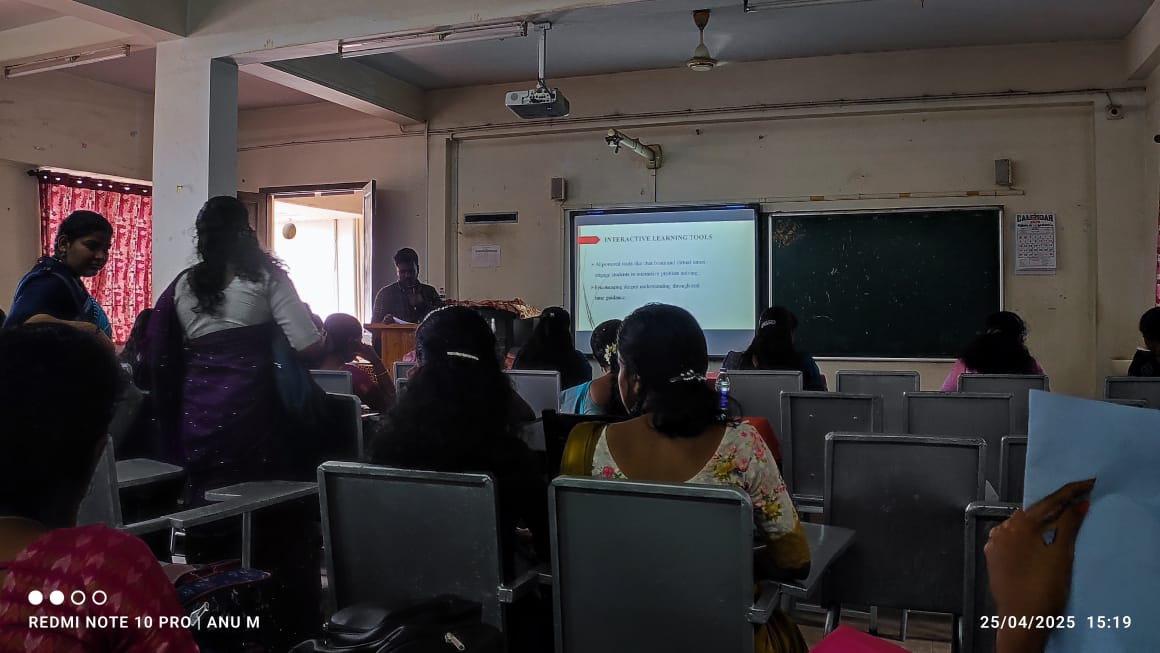National seminar on AIED 2025
NATIONAL SEMINAR ON AIED 2025
Organized by
GRACE COLLEGE OF EDUCATION PADANTHALUMOODU
Paper presentation
on
AI POWERED APPROACHES TO ENHANCE THE COGNITIVE ABILITIES OF THE STUDENTS
Jointly presented by
Shalini P. & Jibin S. D.
B.Ed I year students
Holy Trinity College of Education, Melpalai
Shalini P. & Jibin S. D.
B.Ed I year students
Holy Trinity College of Education, Melpalai
Abstract
Artificial Intelligence (AI) is increasingly recognized as a powerful tool in enhancing the cognitive abilities of students. By integrating AI into educational environments, students benefit from personalized learning experiences that adapt to individual strengths, weaknesses, and learning styles. AI-driven platforms can provide real-time feedback, foster critical thinking, and offer engaging learning resources that promote deeper understanding. Moreover, AI facilitates adaptive learning pathways, which allow students to progress at their own pace while addressing cognitive challenges effectively. This paper explores the role of AI in enhancing students’ cognitive skills, highlighting its potential to foster creativity, problem-solving, and analytical thinking, and its impact on educational outcomes.
Keywords: personalized learning, gamified learning, automated repetitive tasks
Introduction
Artificial Intelligence (AI) has become an integral part of modern education, offering transformative opportunities to enhance the learning experience. Among its many benefits, AI holds significant potential to strengthen the cognitive abilities of students. Cognitive abilities, including memory, attention, problem-solving, and critical thinking, are crucial for academic success and personal growth. By leveraging AI tools and platforms, educators can create personalized, adaptive learning environments that cater to individual needs, encourage active engagement, and provide real-time feedback. This introduction explores how AI is reshaping education by fostering cognitive development and preparing students for the demands of the future.
AI to enhance the cognitive abilities of the students
AI can play a significant role in enhancing students' cognitive abilities by offering personalized and interactive learning experiences. Here's how AI strengthens cognitive skills in education:
1. Personalized Learning: AI tailors educational content to suit individual learning styles and paces. This helps students grasp concepts more effectively, as it provides customized challenges and resources.
2. Adaptive Assessments: AI-driven assessments can adjust the difficulty of questions based on a student’s responses, helping to reinforce critical thinking and problem-solving skills at appropriate levels.
3. Interactive Learning Tools: AI-powered tools like chatbots and virtual tutors engage students in interactive problem-solving, encouraging deeper understanding through real-time feedback and guidance.
4. Data-Driven Insights: AI can analyze students' learning patterns, identifying areas of weakness and providing targeted exercises. This promotes critical thinking by focusing on areas that need improvement.
5. Gamified Learning: AI can introduce game-like elements to learning, which improves cognitive abilities such as memory, attention, and logical reasoning. Gamified tasks stimulate cognitive processes in an engaging way.
6. Language and Communication Skills: AI-based language learning apps and writing assistants help students improve their vocabulary, grammar, and comprehension, fostering cognitive growth in communication skills.
7. Encouraging Creativity: AI systems can assist students in brainstorming and creative problem-solving, helping them think outside the box. Tools that provide instant feedback on creative projects (like coding or design) allow for iterative learning.
8. Automated Repetitive Tasks: By automating repetitive tasks, AI frees up time for students to focus on higher-order thinking, such as analysis, synthesis, and evaluation.
Through these methods, AI can significantly contribute to strengthening students' cognitive abilities by promoting critical thinking, problem-solving, and creativity.
CONCLUSION
AI plays a crucial role in strengthening students' cognitive abilities by providing personalized learning experiences, adaptive assessments, and instant feedback. Through intelligent tutoring systems, AI can cater to individual learning styles, helping students grasp complex concepts at their own pace. Additionally, AI-powered tools enhance critical thinking, problem-solving, and creativity by offering interactive and engaging content. By automating routine tasks, AI also allows educators to focus more on mentoring and cognitive development. In conclusion, AI has the potential to significantly enhance cognitive learning by making education more accessible, personalized, and effective.
References
Kirschner, P. A., Sweller, J., & Clark, R. E. (2006). "Why minimal guidance during instruction does not work: An analysis of the failure of constructivist, discovery, problem-based, experiential, and inquiry-based teaching." Educational Psychologist.
Lester, J. C., et al. (2013). "The impact of a pedagogical agent on cognitive and affective outcomes in a game-based learning environment." Proceedings of the 13th International Conference on Artificial Intelligence in Education.
Pane, J. F., et al. (2014). "Effectiveness of cognitive tutor algebra I at scale." Educational Evaluation and Policy Analysis.
Zawacki-Richter, O., et al. (2019). "Systematic review of research on artificial intelligence applications in higher education – where are the educators?". International Journal of Educational Technology in Higher Education.







Comments
Post a Comment